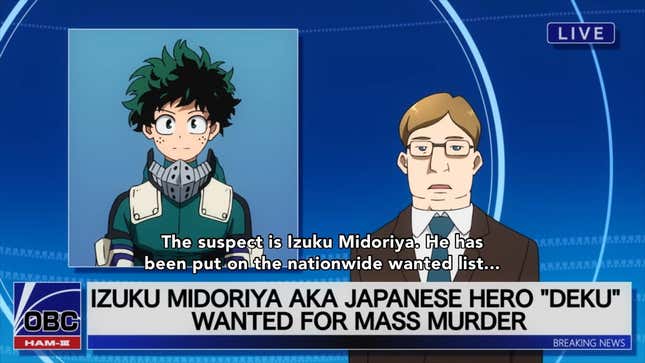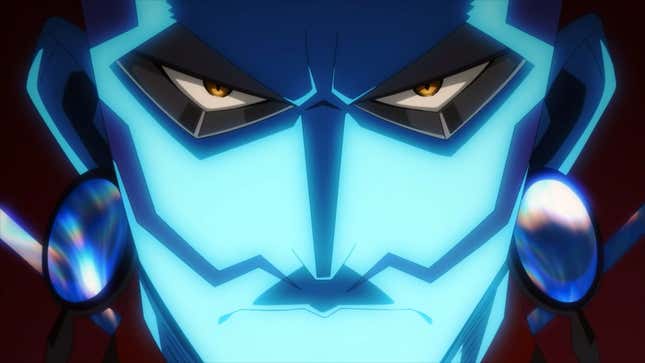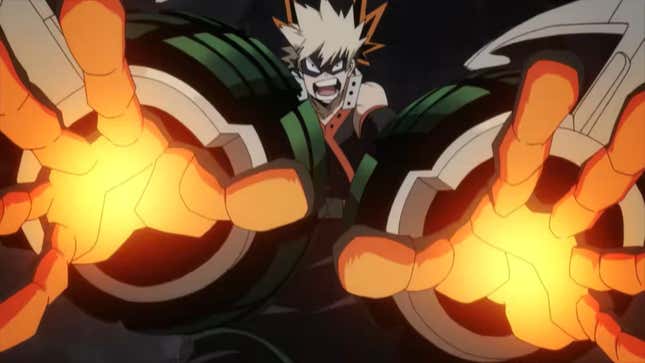World Heroes Mission, the third movie to spring from the exceedingly popular shonen anime series My Hero Academia, is about to arrive in theaters. Ahead of the theatrical release, I spoke to the film’s voice actors about the evolution of their characters and how they’ve adjusted to working from home during the pandemic.
World Heroes Mission follows Izuku Midoriya, Katsuki Bakugo, and Shoto Todoroki shortly after their hero internship with Shoto’s father and the number-one Pro Hero, Endeavor. Midoriya and his new friend Rody Soul are framed for a crime they didn’t commit and must clear their names, while also having only two hours to save the world from new villain Flect Turn—who is on a mission to cleanse the world of quirks (that is, people with superpowers).
The regular cast, plus newcomers
Series newcomers Ryan Colt Levy and Robbie Daymond, who play Rody and Flect respectively, said they felt right at home joining the cast in portraying their characters on the big screen.
“I think the coolest part about being in the films from an aspect of being thrust into a larger world as a whole is that it tells a nice little self-contained story,” Daymond said. “For us as newbies, that’s a gift because we just get to be a part of that and ride that arc out. […] Thankfully these characters are wonderfully fleshed out [and] the writing’s really enjoyable. It makes our job a lot easier.”
For Levy, it was easy to bring Rody to life because he said they shared odd similarities—which he didn’t elaborate on—that let him feel his way through portraying the sun-kissed hero without thinking too much about how he sounded while doing so.
“Even though I’ve adored the show for so long, [I had to] kind of turn off my fanboy brain and let myself just exist in this thing and let it be spontaneous,” Levy said. “That was the only way I could really give Rody what he needed.”

Justin Briner, who voices series main protagonist Midoriya, said each character’s growth has been rewarding for both himself and fans who’ve followed Midoriya on his journey to becoming the world’s number-one hero, Deku, over the past five seasons.
“Deku has come a long way. He’s definitely added some tools to his belt, he’s grown more confident [and] he’s been able to rely more on his friends and gain more friends over time,” Briner said.
Clifford Chapin, Bakugo’s actor, said the hot-headed hero in training has grown a lot during season five’s Endeavor Agency arc and “a little bit” in the movie as well.
“Going from someone who’s so antagonistic, especially towards Deku, [and being] so abrasive and difficult for his classmates at the beginning of the series; we’ve seen him be humbled and have to learn how to work together with other people,” he said.
When it comes to tumultuous relationships that have had heightened emotions as the season has developed, one relationship that rivals that of Deku and Bakugo is that of the new number-one hero Endeavour and his son Shoto.
David Matranga and Patrick Seitz, voice actors for Shoto and Endeavour, said they informed their portrayals of the pair’s raucous relationship from their lived experiences with their fathers.
Shoto and Endeavor’s relationship felt like “bingo” for Seitz, allowing him to see the “squares” he’d covered in his own life and the squares he would have to portray in Endeavour and Shoto’s relationship.This provided him moments of introspection regarding when he and his father didn’t see eye-to-eye.
“You’re like, okay, here was a dude that was trying his best imperfectly and you can take it or you can leave it. That’s sort of the same thing with Endeavor,” Seitz said.
Although Matranga didn’t go through the same conflict of being forced into becoming a child prodigy like Shoto, he relates to the character in that they both live inside their own heads and can be hard on themselves while pursuing their ambitions.
Matranga said fans will see the character a bit freer and more confident in his ability not only in using his powers but in communicating with his teammates.
For Seitz, seeing their characters work on improving themselves in the show proper pays off in dividends in World Heroes Mission in subtle ways that are deserved for both father and son.
“Shoto and Endeavour both are not open books. Endeavour’s BS is a part of Shoto’s BS ‘cause that’s the parent-child dynamics since the dawn of time,” he said.
Although subtlety is not a virtue of his, Seitz said playing Endeavour has been a rewarding experience for him. Endeavor’s “glacial pace” at improving not only himself and his relationship with Shoto provided “sweet payoff” for Seitz.
Dubbing from home is an acquired taste
While the characters in the film had to overcome a global crisis in the form of Flect Turn, their voice actors had to tackle one of their own when it came to bringing their characters to life, either in a hybrid studio setting or working from home in their own booths. Luckily for the voice-acting community, working from home was already an initiative that was in effect before the pandemic, with many anime from the past few seasons being dubbed from the safety of the actors’ homes.
When it came to maintaining their characters’ chemistry through line delivery, the My Hero Academia voice actors said ultimately it has been business as usual given that they’re still able to riff off other actors’ previously recorded audio.
When it came to dubbing the movie during the pandemic, Levy was able to record his lines in a hybrid setting where he would be remote some days recording from his home in Texas with Colleen Clinkenbeard, fellow voice actor and Funimation’s ADR and line producer, as well as working from a studio, which he had missed dearly. After being stuck in his home booth for a year, he said getting to go into a studio again was very freeing.
Similarly, Daymond was also able to record his lines in a studio as well as from home in his “monolith” of a voiceover booth he built himself that he doesn’t wish to use “ever again.” He said he feels safe in studios thanks to LA being good with covid-19 protocols and providing UV air filters, tests, and “lots of time between [sessions]” for voice actors.
“My favorite part about this job is the people, regardless of whether they’re on the other side of the glass or not, and to not have to set my own levels and do my own engineering and all of that, and be able to just be in the space and concentrate solely on the performance. I think that’s how it was meant to be” Daymond added. “Not complaining mind you, we as voice actors, were very fortunate to be able to transition into remote over covid and continue to work. I’ve got a lot of friends on camera who weren’t able to do that. And a lot of people in production’s lives were uprooted just like the rest of us. Fortunately [in] voiceover, we were able to carry on and continue to make cartoons, video games, and anime.”

As for the series’ new voice actors, daily rituals old and new have kept them grounded before going into their booths.
“Every day before my session, I light a little fire and I cover it from the wind and cold. That’s the flame of voiceover that keeps burning in my soul before I step into my booth,” Daymond said. “That, and I also like to take a nice walk in the mornings before my sessions.” Daymond might be new to Hero Aca, but he nailed All Might’s One For All imagery to a T. Mayhaps he has the quirk flowing through his lungs?
Levy, who admits to still being new to the acting industry, said living a long life of working jobs he didn’t necessarily enjoy and rising to meet the day helped him prepare for this “dream job” of acting in World Heroes Mission. He said that even on the worst days of cabin fever, he could “escape to another universe, and that was extraordinary.”
What Seitz realized after recording remotely is that even though at-home solo sessions feel like a solitary pursuit, not being in the same place as his engineer and director made him miss the kinship he’d normally have with his team.
“I don’t think I ever fully realized how much communion I had with those people in the moment, even though there was a window between us,” he said. For Seitz, recording “hit different” when the production team had to work from the confines of their homes.
Despite the growing pains, Seitz said it’s “mind-blowing” that dubbing from home is as viable a solution as it is. Mantranga said he has to remember to not become too comfortable when recording there.He said sometimes he has to remind himself, “’Hey, you’re really doing this here. You can’t just roll out of bed and go to work. You have to maintain that professional aspect no matter where you are.” he said.

Bakugo’s actor, Chapin, was fortunate to be able to set up a booth at home that he said was largely comparable to a recording studio at Funimation.
“The only thing that ever kinda affects anything is sometimes your internet dips,” he said, adding that this has been known to screw up some of the many big screams he does for Bakugo. “Sometimes the internet will just eat it and I’ll have done this big scream and we’ll play it back and it’s like, ‘Ahh-rrrr-aaa-rrr-ahh!’ because the internet slows down for one second. So, then I have to do it again,” Chapin said.
Funimation set up recording schedules for the local voice actors to record in its Texas studio, which felt like “coming home” for Chapin. He thinks there is going to be a continued use of hybrid system moving forward, especially once people continue to improve their home setups to the point where they get closer to the one-to-one sound found in bespoke voiceover studios.
“With a show such as My Hero Academia, where the cast is expanding rapidly every episode, every season, every movie, it’s great to have [dubbing from home] available to us [and] that we’re able to work with actors that maybe aren’t available normally, or just up the street who can just come into the studio,” he said.
In fact, Briner thinks the rise in home studios has been a great innovation for both the short- and long-term of the industry. He sees the trend as an “elegant solution” in part because it’s provided actors access to studios they might not have been able to work with before.
That said, Briner would love to get back into a typical studio environment because that’s where he started his career, and it’s where he’s most comfortable. Plus, they tend to have better equipment.
“In the meantime, until it’s safe [and] until everyone’s ready, I think this has been very rewarding for a lot of people, in a lot of different ways.”
My Hero Academia: World Heroes Mission comes to theaters and the Funimation streaming service on October 29.